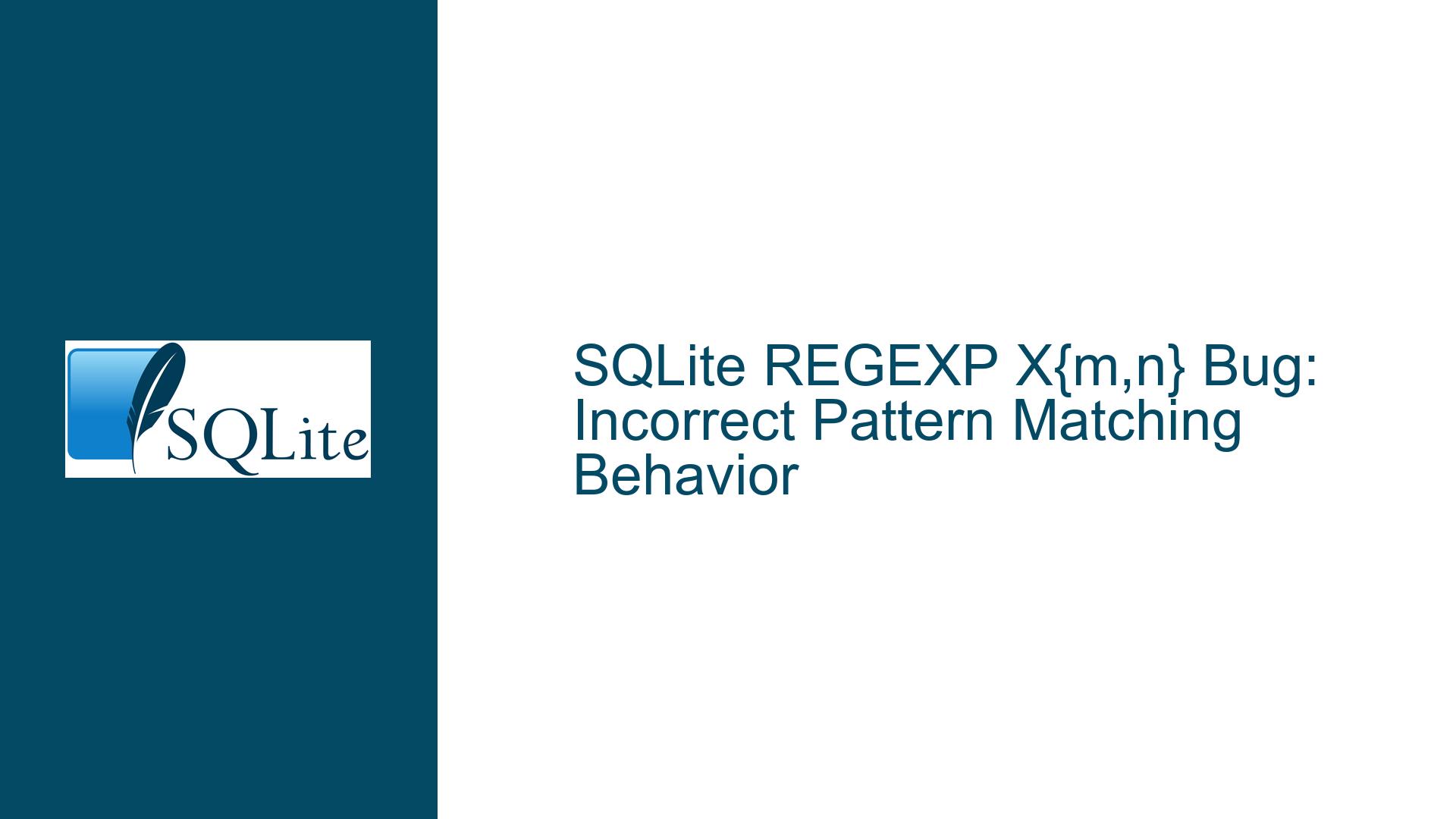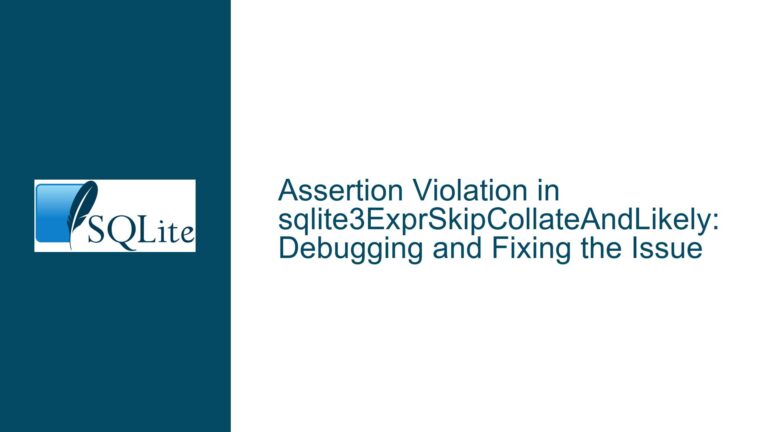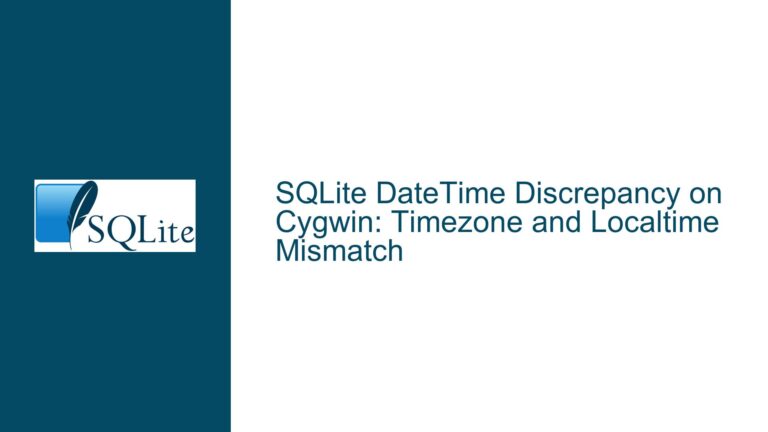SQLite REGEXP X{m,n} Bug: Incorrect Pattern Matching Behavior
Issue Overview: REGEXP Pattern Matching with {m,n} Quantifier
The core issue revolves around the behavior of the REGEXP operator in SQLite when using the {m,n} quantifier in regular expressions. Specifically, the problem manifests when the quantifier is used to specify a range of matches for a character class, such as [a-z0-9]{0,30}. The expected behavior is that the regular expression should match strings that conform to the specified pattern, but the observed behavior indicates that the matching logic is flawed, particularly when the minimum bound (m) is set to zero (0).
For example, consider the following queries:
SELECT 1 WHERE 'fooX' REGEXP '^[a-z][a-z0-9]{0,30}$'; -- returns 1, not NULL
SELECT 1 WHERE 'fooX' REGEXP '^[a-z][a-z0-9]{0,30}X$'; -- returns NULL, not 1
The first query incorrectly returns 1, indicating a match, even though the string 'fooX' does not fully conform to the pattern ^[a-z][a-z0-9]{0,30}$. The second query, which includes an additional X at the end of the pattern, correctly returns NULL, indicating no match. However, when the quantifier is changed to {1,30}, the behavior aligns with expectations.
This discrepancy suggests a bug in the implementation of the {m,n} quantifier in SQLite’s REGEXP operator, particularly when the lower bound is zero. The issue is further complicated by the fact that the REGEXP operator is not natively part of the SQLite library but is provided as an extension, which may introduce variability in behavior depending on how the extension is implemented or loaded.
Possible Causes: Flawed Quantifier Logic and Case Sensitivity
The incorrect behavior of the {m,n} quantifier in SQLite’s REGEXP operator can be attributed to several potential causes:
Quantifier Logic Flaw: The primary issue appears to be in the logic handling the
{m,n}quantifier, especially whenmis zero. The quantifier is intended to match the preceding element at leastmtimes and at mostntimes. However, whenmis zero, the implementation may incorrectly allow matches even when the pattern does not fully align with the input string. This is evident in the first query, where'fooX'is incorrectly matched against^[a-z][a-z0-9]{0,30}$.Case Sensitivity Mismatch: Another potential cause is the handling of case sensitivity in the regular expression engine. The pattern
[a-z]is intended to match lowercase letters, but the observed behavior suggests that it may also match uppercase letters, as if the(?i)case-insensitive flag were implicitly applied. This could explain why'fooX'is incorrectly matched against^[a-z][a-z0-9]{0,30}$, as theXat the end of the string is being treated as a valid match for[a-z0-9].Extension Implementation Variability: The
REGEXPoperator is not part of the core SQLite library but is provided as an extension. The behavior of the operator may vary depending on how the extension is implemented or loaded. For example, some users may load a custom regex engine (e.g., PCRE) that behaves differently from the default implementation. This variability can lead to inconsistent results, as seen in the discussion where different users report different outcomes for the same queries.Documentation Ambiguity: The SQLite documentation does not clearly specify the default behavior of the
REGEXPoperator, including the supported regex syntax and any implicit flags (e.g., case insensitivity). This lack of clarity can lead to confusion and misinterpretation of the expected behavior, particularly when users rely on the default implementation provided by the SQLite shell or other environments.
Troubleshooting Steps, Solutions & Fixes: Addressing the REGEXP Quantifier Bug
To address the REGEXP quantifier bug and ensure consistent and correct behavior, the following steps and solutions can be implemented:
Validate Quantifier Logic: The first step is to thoroughly validate the logic handling the
{m,n}quantifier in theREGEXPoperator. This involves testing various combinations ofmandnvalues to ensure that the quantifier correctly matches the intended number of occurrences. Special attention should be given to cases wheremis zero, as this appears to be the primary source of the bug. The implementation should be updated to ensure that the quantifier only matches when the input string fully conforms to the specified pattern.Explicitly Handle Case Sensitivity: To avoid ambiguity, the
REGEXPoperator should explicitly handle case sensitivity. This can be achieved by ensuring that the[a-z]character class only matches lowercase letters unless the(?i)flag is explicitly included in the pattern. Additionally, the documentation should clearly state the default case sensitivity behavior and provide examples of how to use the(?i)flag for case-insensitive matching.Standardize Extension Implementation: Given that the
REGEXPoperator is provided as an extension, it is important to standardize its implementation across different environments. This includes ensuring that the default regex engine used by the SQLite shell and other common environments (e.g., SQLite Fiddle) behaves consistently. If users load custom regex engines (e.g., PCRE), they should be aware of any differences in behavior and adjust their patterns accordingly.Update Documentation: The SQLite documentation should be updated to clearly specify the behavior of the
REGEXPoperator, including the supported regex syntax, any implicit flags, and the default implementation provided by the SQLite shell. This will help users understand the expected behavior and avoid confusion when working with regular expressions in SQLite.Provide Workarounds: Until the bug is fixed, users can employ workarounds to achieve the desired behavior. For example, if the
{m,n}quantifier is causing issues, users can rewrite their patterns to avoid using it. In the case of the'fooX'example, the pattern^[a-z][a-z0-9]{1,30}$can be used to ensure that at least one character is matched, avoiding the issue with{0,30}. Additionally, users can load a custom regex engine (e.g., PCRE) that provides more consistent behavior for their specific use cases.Report and Track the Bug: Users encountering this issue should report it to the SQLite development team, providing detailed examples and steps to reproduce the problem. This will help the team prioritize the issue and work on a fix. In the meantime, users can track the bug’s status and any updates through the SQLite forum or issue tracker.
By following these steps and solutions, users can mitigate the impact of the REGEXP quantifier bug and ensure that their regular expressions behave as expected in SQLite. Additionally, addressing the underlying causes of the issue will help improve the overall reliability and consistency of the REGEXP operator in future releases.






